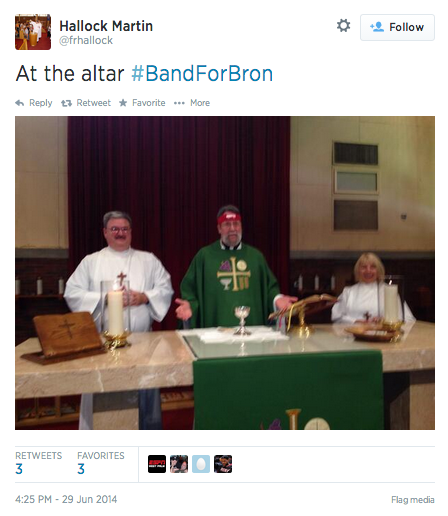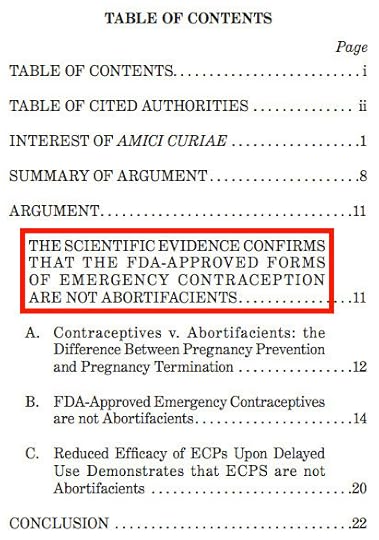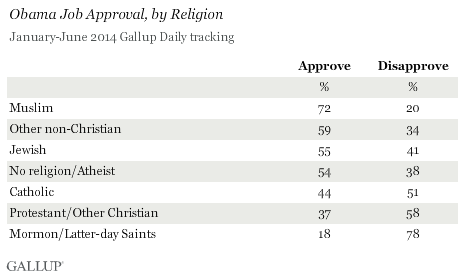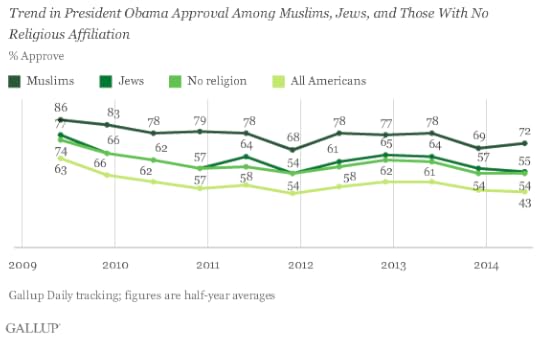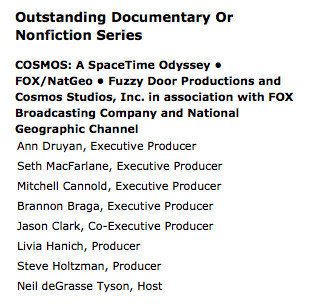Hemant Mehta's Blog, page 1979
July 11, 2014
About Those Churches That Prayed for LeBron James to Stay in Miami…
Now that LeBron James has announced his return to Cleveland with an enthusiastic “I’m not promising a championship,” I just wanted to take a moment to remind everyone of the Miami-based churches that were praying for LeBron to stay in South Beach using the hashtag #BandsForBron:
I guess Jesus prefers cooler climates.
(via Fox Sports)
Liveblogging TAM2014: Day 1 Recap
Greetings from sunny (presumably. I haven’t been outside in two days) Las Vegas!
I’m here at The Amazing Meeting 2014 with my trusty sidekick/photographer/gentleman friend Michael Greiff to live blog as much as the event as possible. While I’m here, I will also be recording a few Hemant-less (boo!) episodes of the Friendly Atheist Podcast.
Yesterday (Thursday) was our first day here, and between trying to schedule interviews and getting settled, we were able to attend one of the workshops.
I dropped into the “Blogging and Skepticisim: The Good, the Bad and the Ugly” workshop featuring the fine folks over at Skeptic Ink, and it was really delightful. Speakers inclded Beth Ann Erickson, Vandy Beth Glenn, Wendy Hughes, Jacques Rousseau and a fourth person whose name isn’t in the program and I don’t remember because I’m terrible at my job.
Not pictured above is Vandy Beth Glenn, who, upon her arrival, explained that she was running late because her hotel room is all the way at the end of the hallway, which she wrapped up beautifully by talking about this post, which I found delightful:
But I arrived at the South Point hotel and casino by early afternoon and checked into my room, which is all the way at the other end of a hallway from the elevators. One of the criminologists on the TV show CSI once said rooms so situated are nicknamed the “murder room,” because they’re too far from most other rooms on the floor for the noise to be heard.
I’ve tried to find confirmation of this, and can’t. It seems unlikely on several fronts. Mainly, are premeditated murders committed in hotel rooms often enough for this to become common parlance? If a person were planning a murder, would he (statistically, it’s a “he”) invite the victim to his hotel room first? More likely, he’d go to their hotel room, and it’s unlikely he could count on the victim choosing to rent a room at the end of the hall.
Moreover, murderers get to choose their methods, and there are many quiet ways to kill a person. A murderer thinking far enough ahead to specify this room would also have the forethought to buy a silencer, a garrote, some poison, or what-have-you (you’ll all be pleased to know I’m not well-studied in murder weapons). He could plan it so that it makes as little noise as possible.
I found it endlessly amusing and well put together, as were all the presentations by the bloggers, and had the opportunity to meet with them and say as much at the welcome reception later that day.
Then, most of us got the opportunity to watch a screening of An Honest Liar, a new documentary about James Randi. I’ve heard about this movie since TAM last year and was really looking forward to seeing it and I was not disappointed. It was really remarkable, and I encourage everyone to get out and see it as soon as it comes to a theater near you.
I chatted with Tyler Measom, one of the director and producers a bit after the movie and he was delightful, so I invited he and his co-director/producer, Justin Weinstein, to come on the podcast, so keep your eye out for that in a few weeks.
Okay, that’s all I’ve got for you right now. Again, if you’re attending TAM, please come by and say hello. If there’s anyone attending who you’d like to hear on the podcast or just want to say hi or that I’m doing a wonderfully medium job, tweet me @blueburie.
More soon!
Pot, Meet Kettle: Mark Regnerus Says Study Showing Same-Sex Couples Produce Happier Kids Has Methodological Flaws
Mark Regnerus, the Christian sociologist infamous for a miserably flawed study about LGBT parents, is upset.
He’s upset because earlier this month, researchers from the University of Melbourne in Australia released the world’s largest study of same-sex parents and their kids. The study found that on certain measures, children of same-sex couples seemed better off than children of different-sex couples. Regnerus disagrees with those findings, as his own study will tell you. And he’s upset that we’re not as outraged as he is.
For those unfamiliar with him, Mark Regnerus is best known for the New Family Structures Study, a survey that attempted (and failed) to prove children of gay parents were poorly adjusted, traumatized for life, etc. This week, he published a scathing response to the Australian study in which he tries to discount it due to its “methodological weaknesses.”
But the problem, as you may know, is that nobody trusts Regnerus’ opinion of what is or is not scientifically sound. His study was denounced by the American Sociological Association (and by his own university) as fundamentally flawed in a number of unforgivable ways. When conservatives cite it as a reason to outlaw marriage equality or same-sex adoption, the argument ends quickly. In fact, this past March, when Michigan’s gay marriage ban was struck down, Judge Bernard Friedman said of Regnerus (who testified in defense of the ban):
The Court finds Regnerus’s testimony entirely unbelievable and not worthy of serious consideration. The evidence adduced at trial demonstrated that his 2012 “study” was hastily concocted at the behest of a third-party funder, which found it “essential that the necessary data be gathered to settle the question in the forum of public debate about what kinds of family arrangement are best for society” and which “was confident that the traditional understanding of marriage will be vindicated by this study”…
While Regnerus maintained that the funding source did not affect his impartiality as a researcher, the Court finds this testimony unbelievable. The funder clearly wanted a certain result, and Regnerus obliged.
Undeterred by his own lack of expertise, here’s what Regnerus has to say about the Australian parenting study:
… until social scientists decide to do the difficult, expensive work of locating same-sex attracted parents (however defined) through random, population-based sampling strategies — preferably ones that do not “give away” the primary research question(s) up front, as ACHESS did — we simply cannot know whether claims like “no differences” or “happier and healthier than” are true, valid, and on target. Why? Because this non-random sample reflects those who actively pursued participating in the study, personal and political motivations included.
…
Another reason for healthy skepticism is that the ACHESS participants — parents reporting about their children’s lives — are all well aware of the political import of the study topic, and an unknown number of them certainly signed up for that very reason. As a result, it seems unwise to trust their self-reports, given the high risk of “social desirability bias,” or the tendency to portray oneself (or here, one’s children) as better than they actually are. Again, it is impossible to know exactly how much of a problem such bias presents in this situation. But I think the temptation to report positive assessments could be elevated in this self-selected sample and on this sensitive topic. (In the end, the differences between the ACHESS parent reports and the population-based comparisons were more modest — about 3 to 6 percent — than I’d expect.)
But here’s the thing: That information has already been acknowledged by lead researcher Simon Crouch and the other researchers in the study itself. It may not be extensively discussed in the press, but the study’s constraints are no secret. (More on that below.)
Nonetheless, Regnerus thinks of himself as a sly tattletale who’s exposing the *homosexual agenda* once and for all. To further make his point, here’s why he thinks his study is a much better alternative for the casual reader:
Skepticism about the ACHESS sample is all the more reason to do a random study that doesn’t advertise its intentions beforehand. That’s exactly why the survey I oversaw, the New Family Structures Study (NFSS), elected to talk to the children after they had grown up, to skip the parents entirely to ensure a more independent assessment, not to broadcast our key research questions in the title or initial screener questionnaire, and to locate participants randomly in a large population-based sample. If you’ve been paying attention, however, you’ll know that my NFSS studies — which mapped 248 respondents who told us their mother or father had been in a same-sex relationship — came to rather different conclusions than the ACHESS study has.
Actually, if you’ve “been paying attention,” you’ll know that virtually no part of the scientific community stands behind the NFSS. ThinkProgress did an excellent job of outlining the problems with the Regnerus study in a nutshell, showing why it’s a completely inaccurate portrayal of LGBT families:
Regnerus did not study children born or adopted into same-sex parent families, only those who seem to recollect one of their parents ever having a same-sex relationship.
Regnerus compared that group, most of which had experienced family dissolution, only to stable, married, opposite-sex families — i.e. he compared unstable to intact.
Regnerus ignored whether the children lived with or were raised by the parents who had a same-sex relationship.
Regnerus only identified these “gay” parents based on the recollection of the children, not based on how the parents actually identify or live their lives.
Most of the factors Regnerus analyzes were adult outcomes, not childhood outcomes, and could very well have had nothing to do with the relationships of the children’s parents.
The Australian study isn’t perfect (not that any study of living, breathing humans can be). The researchers acknowledged some of the limitations of their work, as any decent researchers do when publishing a study. In fact, they discussed the very problem that Regnerus is trying to ignite, and explained precisely why there’s no way around it just yet:
… the use of a convenience sample to access the highest number of participants needed to be worked through carefully as there are no current options to access data through regular population surveys or administrative data sets. Every effort was made to recruit a representative sample, and from the limited data available about same-sex parent families it appears that the ACHESS sample does reflect the general context of these families in contemporary Australia.
Same-sex families are not integrated into all population surveys in the way that other families are (and you can bet it’s far easier to find information about the whereabouts of religious families than LGBT families). It is wildly more difficult to access information about same-sex families all across the board. (Spoiler alert: It’s because Christian extremists like Mark Regnerus have marginalized LGBT people for so long that our existence is only just beginning to be recognized by governmental institutions.) This isn’t some trick to only recruit happy families in order to cover up the unhappy ones; this is essentially the only way to reach people.
And the researchers weren’t done admitting the limitations:
The self-selection of our convenience sample has the potential to introduce bias that could distort results. It is clear that the families from the ACHESS are earning more and are better educated than the general population. This has in part been allowed for in the statistical analysis by incorporating numerous control variables that are recognised to have an impact on child health outcomes but the results should be read with these differences in mind. If systematic bias was at play however, it would be anticipated that all outcome variables would demonstrate higher scores across the sample. As it is, only three key variables on the CHQ demonstrated significant difference, and none of the scale scores from the SDQ.
In the same section, the researchers point out that while parent-reported measures of a child’s health are problematic, this is the same data collection method that was and is used in the general population surveys to which their data was compared. No surprises here.
Nobody — especially not the authors of the study — is trying to hide these shortcomings; it’s the media’s fault if the coverage is flawed or overhyped. The figure that made headlines was that children of same-sex parents scored 6% higher than the population on measures of “general health and family cohesion,” and in most headlines, that translated to “happier and healthier kids.” (I admit I did it too!)
Bobby Ross Jr. at Get Religion points out a few examples of where publications skimmed over some of the details and says only a few of them had offered any criticism:
But before we all get too excited about this research, the Post did include a quick, obligatory note of caution:
But Benjamin Siegel, professor of pediatrics at the Boston University School of Medicine, said there are limits with such research. He told BU Today last year that none of the studies has been a randomized, controlled trial and that all studies on same-sex parenting are small since there aren’t as many same-sex parents.
There are limits, huh? Well, not if you read the Globe story, which manages to avoid such irritating naysaying.
Okay, fine. Making a sweeping statement without acknowledging room for error is irresponsible, and plenty of reputable sources are guilty of it (often, and with other stories, too). But criticizing the media isn’t the same thing as criticizing a study because you don’t like its results.
Mark Regnerus is crying wolf because scientists aren’t backing away from this survey like they did his. The Australian survey isn’t the first look at LGBT parents and it won’t be the last, but this temper tantrum won’t make a difference in how the work is being done. Regnerus is only making himself look bad, and ultimately, that’s much better for us.
Woman Whose Curly Hair Formed the Word “God” Doesn’t Realize It Could Also Say “666″
Kristin Kissee, a cancer survivor, noticed something when looking back through old pictures of her regrown hair:
The curls above her forehead appeared to spell out the word “God” in the picture taken after the cancer treatment.
She believes the holy hairdo — which is only visible in that one photo — was God’s way of sending her reassurance when she needed it.
“I was overcome with feelings of joy and serenity,” she told HuffPost. “I cried. God answered my prayers.”
Look… I’m really glad she’s doing better. But curly hair isn’t a sign of God. It’s just a sign that your hair forms loops. It’s open to interpretation.
Check it out:
Just that easy.
Kissee, by the way, says she’s not a fan of organized religion, though she clearly believes in a higher power. Despite her improving health, it’s only wishful thinking to suggest that God is sending her a message.
(via Boing Boing)
After Rejecting Wiccan, Huntsville City Council Promotes “Diversity” by Inviting Methodist to Give Invocation Prayer
A couple of weeks ago, we learned that the City Council in Huntsville, Alabama had invited Blake Kirk to deliver an upcoming invocation, only to rescind that offer after learning that he was a Wiccan. They cited “community fears” as the reason for his rejection.
Some readers wrote emails to council members in response, and the general consensus among those members seemed to be that they had no idea why this happened. The selection of invocation speakers, they said, was done by Rev. Frank Broyles, a local interfaith leader who coordinated the invocation calendar.
Well, after that brouhaha, the council was determined to make sure future invocations would reflect the “diversity of beliefs of Huntsville citizens.”
It would be much easier to either have a moment of silence — which is what the City Council will continue to do from time to time and also if a minister has to cancel at the last minute — or to have nothing, Broyles said. But the struggle to acknowledge and honor the diversity of paths in the community that give citizens meaning is worth engaging.
So what did they do at their meeting last night to showcase that diversity?
They invited a Methodist:
Debbie Esslinger, an active lay member of Trinity United Methodist Church and volunteer leader with Interfaith Mission Service, urged the mostly full council chambers to “reach across our differences and beyond our comfort zones to discover the common threads in all of us.”
They’re really reaching out into the nether regions of Huntsville, aren’t they…?
City Attorney Peter Joffrion said that Kirk would be invited back soon, adding, “We decided to pull back, to do some education maybe, and to introduce him more gently at another time.”
“More gently.” As if Kirk was anything but gentle or the Christian critics are going to magically settle down after a couple of weeks.
At least Joffrion and Broyles seem aware that different shades of Jesus aren’t going to be enough to avoid a lawsuit. Kirk will return soon enough and a local Hindu leader will deliver an invocation at the end of the month. It’s not enough, but that’s a good start.
Still, all of this controversy could have been avoided if only the council had allowed Kirk to speak over the complaints of a handful of idiots.
(Thanks to @FreemanToday for the link)
Five Reasons the Hobby Lobby Decision Should Terrify You
This is a guest post written by Andrew Seidel. He is a staff attorney at the Freedom From Religion Foundation.
…
The Supreme Court’s era-defining decision in Burwell v. Hobby Lobby has alarmed many of us, but not enough. Some think this decision won’t affect them or that the reaction is overblown.
There are many, many problems with the majority opinion in Hobby Lobby. Other than the most obvious problem, that corporations are not people capable of forming religious beliefs, five jump out. These problems concern every American — not just atheists, not just non-Christians, and not just women.
The majority opinion’s terrifying legal rewrite offers one glimmer of hope: The problems are solvable. Congress need only repeal the Religious Freedom Restoration Act (RFRA).
As an initial matter, we can ignore the Court’s claim that the Hobby Lobby decision is limited. The five-member all-Catholic majority stated — without reason — that the decision only applied to the birth control mandate and only to closely held corporations. Simply stating that the decision is limited, without providing any logical rationale for doing so, is legally meaningless. Any lower court that looks at the opinion must look for logical reasoning — which does not exist. There are at least 100 cases in the federal courts regarding the birth control mandate, many not involving closely held corporations. Some of those cases challenge all birth control, not just four specific methods — and they’re probably going to win (see Problem #2). Other cases argue that religion can justify discrimination. And since the decision came down, new cases have been filed.
The Supreme Court left the door slightly ajar. But the evangelicals are already kicking the door wide open. If you think this is hyperbole, you’re not paying attention to what has happened since the June 30 decision. This opinion will effect you. Maybe not today, maybe not tomorrow, but soon.
Unless Congress repeals RFRA.
Problem #1: Religion now trumps the law
Nearly 150 years ago, the Supreme Court asked if a citizen could avoid complying with laws “because of his religious belief?” The resounding answer was No. This would make “religious belief superior to the law of the land, and in effect… permit every citizen to become a law unto himself. Government could exist only in name under such circumstances.” In short, to allow religion to trump the civil law was to invite anarchy.
In a country where freedom of religion has let every citizen define religion as he or she sees fit, the consequences of elevating personal beliefs above the law are staggering. 150 years ago this was unthinkable: “Suppose one believed that human sacrifices were a necessary part of religious worship, would it be seriously contended that the civil government under which he lived could not interfere to prevent a sacrifice?” Now, the law bows to sincerely held religious beliefs.
What constitutes your “sincerely held religious belief?” Pretty much anything. Justice Alito pointed out that “no one has disputed the sincerity of [the company owners'] religious beliefs.” A belief’s sincerity or religiosity can be challenged, but seldom is (except in the case of prisoners) and rarely is that challenge sustained. This is why Hobby Lobby’s transparent hypocrisy — providing the same contraception coverage at issue in the lawsuit but dropping the coverage to file the suit — while interesting to those of us with a conscience, was legally irrelevant.
Technically, RFRA requires any burden on a sincerely held religious belief be “substantial.” How substantial? Not very, it turns out. Justice Alito claimed that Hobby Lobby would have to pay millions, but one week later his brethren provisionally ruled that Wheaton College’s religious objection to filling out a two-page form was worthy of an emergency injunction. Even if this rapid expansion of “substantial” as a limiting term had not happened on the heels of Hobby Lobby, the decision itself is expansive. Here’s the causal chain that the Court accepted as a substantial burden on Hobby Lobby’s religion:
A believes that Drug X violates A’s religion
A owns a distinct legal entity, Company H
Company H buys a health insurance plan for its employees, as required
H employs Person B
Dr. C, B’s doctor, recommends and prescribes X for B
B personally chooses to take X
The insurance plan pays for X
Therefore, A’s religion is violated
One would think an employee exercising private choice in consultation with her doctor would sever the chain. After all, even though nearly all voucher funding goes to religious schools, the Supreme Court has upheld school vouchers because they permit “individuals to exercise genuine choice among options public and private, secular and religious. The program is therefore a program of true private choice.” How duplicitous. For this court, the private choice of parents to send their children to parochial schools with public money cuts off any constitutional problems with public money going to a church. But the private choice of a woman in consultation with her doctor and funded by insurance is insufficient to block Hobby Lobby’s pious displeasure.
The Court’s hypocrisy here is on par with Hobby Lobby’s. For if the Greens (who own the company) sincerely cared about their Christian duty, they would not be operating a for-profit enterprise. (Matthew 19:21)
Problem #2: Religion now trumps reality and science in our legal system
This may be the most frightening aspect of the Court’s decision:
The owners of the businesses have religious objections to abortion, and according to their religious beliefs the four contraceptive methods at issue are abortifacients. If the owners comply with the HHS mandate, they believe they will be facilitating abortions…
Did you catch it? “[A]ccording to their religious beliefs the four contraceptive methods at issue are abortifacients…”
This should terrify you.
The Supreme Court elevated an unsupported, unscientific religious belief to an unassailable perch, while totally ignoring the evidence-based, scientific, medical fact that the drugs at issue were not abortifacients. This is actually the culmination of religious cases. Courts have always held that they cannot question the “truth of a [religious] belief” only that it is “truly held.” But now, RFRA, as interpreted in Hobby Lobby, elevates fundamentally wrong beliefs over the rights of other citizens. Ignorance can now be imposed on others.
An abortifacient is a drug that will essentially cause a miscarriage. Physicians for Reproductive Health, the American College of Obstetricians and Gynecologists, the Association of Reproductive Health Professionals, the American Society for Reproductive Medicine, the Society for Adolescent Health and Medicine, the American Medical Women’s Association, the National Association of Nurse Practitioners in Women’s Health, the Association of Forensic Nurses and other groups all signed on to a brief addressing one question: Are the drugs Hobby Lobby objects to, in fact, abortifacients?
The resounding answer was no: “The scientific evidence confirms that the FDA-approved forms of emergency contraception are not abortifacients.”
The doctors and scientists spoke… and the Catholic men on the High Court ignored them. Reality is irrelevant. The central “question that RFRA presents,” according to Justice Alito, is “whether the mandate imposes a substantial burden on the objecting parties’ ability to conduct business in accordance with their religious beliefs.” (Emphasis in original opinion.)
Some companies are challenging all contraceptives covered. The pill, condoms, IUDs — all of these in some way prevent pregnancy. And if, as Catholics do, you believe as the gents of Monty Python so memorably phrased it, that “every sperm is sacred, every sperm is great” and that “if a sperm is wasted, God gets quite irate,” that belief now trumps scientific fact.
There is no end to this shocking disregard for reality. If Ford sincerely believes, for instance, that combustion engines do not pollute or produce carbon dioxide, despite the overwhelming scientific evidence to the contrary, will the court accept their objection to obeying the Clean Air Act?
But it turns out there’s an even bigger problem for environmentalists.
Problem #3: The new race to the bottom
If you’re on the board of the Sierra Club, Natural Resources Defense Council, World Wildlife Fund, Earthjustice, or any other excellent environmental non-profits, Hobby Lobby should terrify you.
Hobby Lobby allows companies to claim a religious belief and thereby exempt themselves from regulation. How long will it take oil companies to realize that, simply by claiming to adhere to this or that myth with a modicum of sincerity, they will no longer have to comply with environmental regulation? The EPA’s regulation of greenhouse gases has been the subject of costly litigation for more than a decade. Now, these companies need only convert to a religious belief that undercuts the regulation. (Even if you think this decision will stay limited to closely held corporations, realize that’s nearly 90% of American businesses.)
Think this is unlikely? Evangelical Christians are notoriously immune to science, reason, facts, and data relating to global climate change. Rep. John Shimkus (R-IL) infamously said that global climate change might be happening, but we don’t need to worry about it because God promised Noah he wouldn’t flood the earth again.
Still think this scenario is farfetched? You might want to read the “Evangelical Declaration on Global Warming.” It states four beliefs and four denials of belief, including “We deny that carbon dioxide… is a pollutant.” How hard would it be for a company to adopt this religious declaration as a sincere religious belief? They’ve been making that argument for years.
Think of the newly-created incentive. Now, companies can avoid regulation simply by converting to or adopting — sincerely, of course — a new religion. This lowers the company’s bottom line and allows them to charge a lower price — they can out-compete their competitors. To stay competitive, every company must exempt themselves from the regulation.
Shimkus’ comments seem to provide fodder for undermining all environmental regulation in the name of God: “The earth will end only when God declares it’s time to be over. Man will not destroy this earth.” But this should not be considered as only affecting environmentalists. This decision allows any company to avoid any law on the basis of religion.
Want to test your drugs on animals? Convert to Christianity, for God gave man “dominion over the fish of the sea, and over the fowl of the air, and over the cattle, and over all the earth, and over every creeping thing that creepeth upon the earth” (Genesis 1:26).
Want to keep women out of management positions? Convert to Christianity, for God permits no woman to “teach or… assume authority over a man; she must be quiet” (1 Timothy 2:12).
Want to avoid FDA food regulations? Convert to Christianity or Judaism, which are full of absurd dietary restrictions and which worship a God who forces the disobedient to “eat the flesh of your sons and the flesh of your daughters” (Leviticus 26:29).
Racism, sexism, and homophobia all have biblical and religious support for any company to avoid complying with all that burdensome equality legislation.
Hobby Lobby fired the starting pistol. The race to the bottom has begun.
Problem #4: The new corporate law
Much like the metaphorical wall that separates government and religion, there is a wall that separates corporations from their owners. And much like Thomas Jefferson‘s wall of separation, the corporate veil, as it is known, has suffered under the Supreme Court. These barriers are not being dismantled or torn as some commentators believe. The reality is more sinister; they are being turned into one-way streets, into valves that let religion radiate out, but exclude the government and law.
Jefferson’s wall has been perverted to allow religion in our government — “In God We Trust,” government prayer, faith based initiatives, the National Day of Prayer, etc. — under the guise of “ceremonial deism” or craven doctrine of legal standing. But the wall still keeps government out of religion, an imbalance that RFRA will only exacerbate.
Hobby Lobby has similarly perverted the corporate veil, which legally separates the corporation (a legal construct) from the individuals (flesh and blood people) who own it. If you sell widgets that poison children, you are personally liable for their deaths. If, on the other hand, you incorporate and your company sells widgets that poison children, the company is liable. If the company goes into debt, you are not personally liable for it.
Enter Hobby Lobby. Now, the veil keeps legal liability, debts, lawsuits, and the like away from the owners, but the owners’ religion flows through the shroud. Thus, the Greens and other owners sit within a fort that protects them from legal liability, but from which they can barrage their hapless employees with religious dogma.
Why didn’t the Supreme Court know about the corporate veil, you might wonder. They did. As FFRF argued in its Hobby Lobby amicus brief for the repeal of RFRA, another amicus brief from dozens of corporate and criminal law professors argued that Hobby Lobby’s argument would eviscerate the corporate veil:
Hobby Lobby and Conestoga each asserts that the religious values of its present controlling shareholders should pass through to the corporation itself. This Court should reject any such “values pass-through” concept. To do otherwise would run contrary to established principles of corporate law.
… The essence of a corporation is its “separateness” from its shareholders. It is a distinct legal entity, with its own rights and obligations, different from the rights and obligations of its shareholders. This Court has repeatedly recognized this separateness.
Plain, simple, well written, and delivered with the gravitas of the nation’s top corporate law experts. But, like the facts presented by medical scientists, it was ignored by the Supreme Court. The majority never even mentions the corporate veil or attempts to refute this cold logic.
Problem #5: The radical redefinition of religious freedom is nearly complete
This was a victory for religious freedom! A win for religious liberty! the Religious Right crowed. Nothing could be further from the truth.
The Hobby Lobby decision is not about religious liberty, it is about redefining liberty. The Religious Right has sought this redefinition for some time. In the 1980s Bob Jones University lost its tax-exempt status due to racial discrimination. It sued the IRS and, as prominent legal scholar Paul Finkelman has written, “at the time, [the case] was perceived as a religious liberty lawsuit.” Its bigotry was religiously-motivated, so many Christians thought it an issue of religious liberty.
Former Mississippi senator, governor, and Klan member Theodore Bilbo thought that interracial marriage, “miscengenation and amalgamation are sins of man in direct defiance to the will of God.” His book, gruesomely subtitled “Separation or Mongrelization,” was published back in 1946. For Bilbo, the right to use his religion to discriminate was “a battle for constitutional liberty.”
My friend and colleague at Americans United for Separation of Church and State, Rob Boston, has written an excellent book on this very topic, with the much better subtitle “Why Religious Freedom Doesn’t Give You the Right to Tell Other People What to Do.” Boston puts this attempt to destroy the meaning of words to rest and I highly recommend his book:
Religious Right leaders and their followers often claim that they are being persecuted in the United States. They should watch their words carefully. Their claims are offensive; they don’t know the first thing about persecution.
… In some countries, people can be imprisoned, beaten, or even killed because of what they believe. Certain religious groups are illegal and denied the right to meet. This is real persecution. By contrast, being offended because a clerk in a discount store said “Happy Holidays” instead of “Merry Christmas” pales…
Far from being persecuted, houses of worship and the religious denominations that sponsor them enjoy great liberty in America. Their activities are subjected to very little government regulation. They are often exempt from laws that other groups must follow.
The religious attempt to redefine words is reminiscent of totalitarianism’s devastating effect on language. George Orwell recognized this in his masterpiece 1984: “[I]f thought corrupts language, language can also corrupt thought.” Syme, the character that edits the Newspeak Dictionary, dreamily opines, “It’s a beautiful thing, the destruction of words.”
When James Madison wrote in Federalist, no. 63 that “liberty may be endangered by the abuses of liberty, as well as by the abuses of power…” he was discussing the Senate. But the striking phrase is apt here. The redefinition of “religious liberty” from a protection of one’s cherished belief, into a weapon for imposing that belief on others is both an “abuse of liberty” and an abuse of the English language.
One bright spot
There is one slender positive in all this — the Hobby Lobby decision did not interpret the Constitution. The decision is based on RFRA, a statute. Repeal RFRA and the decision vanishes. Repeal RFRA and we get another chance to argue this on constitutional grounds. Even this Supreme Court might be convinced to decide a Hobby Lobby-like case brought under the Constitution differently. Both Justices Scalia and Kennedy, who were in the uniformly male, Catholic majority in Hobby Lobby, decided in a 1990 case, Employment Division v. Smith, against elevating religious beliefs over the Constitution. Scalia wrote the opinion. If we repeal RFRA — and there are many good reasons for doing so beyond this recent debacle — our Constitution ought to correct these problems.
Nearly 40% of Non-Religious Americans Disapprove of Obama’s Job Performance… but We’d All Still Vote for Him
President Obama’s job approval rating for the first half of this year has been 43%. (Which sounds low until you realize Congress is at a pitiful 7% approval.)
But in a just-released Gallup poll, they broke down those numbers by religious groups and found that Muslims overwhelmingly support him, Mormons overwhelmingly disapprove of him (they’re still upset about Mitt Romney, I’m sure), and the atheists (mixed in with those who use no religious label but who may believe in God) are roughly split but still on his side:
These numbers aren’t too surprising. Of course very conservative religious people — Catholics, evangelical Christians, Mormons — are going to have their problems with a (moderately) liberal president, especially on social issues. Just the opposite with American Muslims, Jews, and atheists. Maybe you don’t expect Muslims to fall into that crowd, given that they tend to be conservative in so many non-political ways; however, I think they understand that he supports their religious freedom and he isn’t waging a war against Muslims. (Hell, the Religious Right loves to say he’s one of them, anyway.)
Here’s the more important thing we should be asking: Even if 38% of the “Nones” (and all those Muslims, Jews, and other non-Christians) “disapprove” of Obama, would we vote for his opponent if a Presidential election were somehow held today?
Not. A. Chance.. Why the hell would we vote for the Republican candidate who, most likely, is just a lackey for the Religious Right? Does anyone think most atheists would throw their support behind Ted Cruz or Rick Perry? Even Jeb Bush or Rand Paul wouldn’t get the majority of our support. We know why people are disappointed with President Obama. A lot of us wish he could do more (Congress be damned). There’s plenty of reason to disapprove of how Obama’s doing in his job. But make no mistake: he would still have our vote. And, presumably, so will Hillary Clinton.
Disapproval only matters, politically speaking, if there’s a better alternative, and there’s no better option right now for religious minorities. It reminds me of this Saturday Night Live sketch:
Obama would have to *seriously* fuck up before he loses our support so much so that we’d consider flipping parties.
(Obviously, these are generalizations. There will inevitably be a small percentage of atheists and other religious minorities who won’t vote for him. But the key word there is “small.”)
By the way, the Gallup poll also notes the approval ratings from all the religious groups have dipped since 2009 — and they’ve all fluctuated more or less the same way since then, too:
What does that tell us? Gallup’s Jeffrey M. Jones explains:
Clearly, members of various religions view the president quite differently, but this may be attributable more to whether Obama’s Democratic affiliation matches the political leanings of each religious group, and less to the specific policies and actions he has taken throughout his presidency.
In that sense, we’re no different from any other religious group.
July 10, 2014
More Than a Year Later, School Board’s Decision to Not Have Prayers at Meetings Still Controversial
In May of 2013, the Rockingham County Board of Education (in North Carolina) debated whether or not to pray at meetings instead of sticking to a moment of silence.
One board member, Leonard Pryor, was so appalled prayer might even be considered that he resigned in protest, presumably before any lawsuits came the board’s way:
Leonard Pryor
Weeks later, after plenty of discussion, the board correctly voted 7-3 against the prayers:
“We were elected to serve the students of Rockingham County,” said board member Amanda Bell, who voted against the motion. “We were not elected to serve ourselves.”
Chairwoman Nell Rose, Vice Chairman Hal Griffin, as well as board members Wayne Kirkman, Elaine McCollum, Lorie McKinney and Bob Wyatt also voted against it.
I felt it was a smart move on the board’s part. Getting down to business would allow them to focus on doing what’s best for students instead of waste time appeasing Christians who think all government meetings ought to be like church services.
It’s been more than a year since all of that transpired and it appears that community members aren’t letting it go. Already, on the first day they could, five challengers filed paperwork to run for seats in the upcoming school board elections. (While Pryor’s seat is still vacant, two of the other four seats are currently held by board members who voted against the prayers.)
Prayer has still been a major source of controversy over the past year, and it may be a reason more people than usual want to oust some of the incumbents:
Many local pastors have attended board meetings and led participants in prayer during public comments.
That led to friction between [Board Member Ron] Price and board member Amanda Bell, whom he later accused of being un-Christian. Bell said the statement was baseless, and she just wanted him to honor the board’s decision.
People can file to run for the board through July 18, before the November elections.
(Portions of this article were posted earlier. Thanks to Brian for the link)
COSMOS: A SpaceTime Odyssey Receives 12 Emmy Nominations
Earlier today, it was announced that COSMOS: A SpaceTime Odyssey received an impressive 12 Emmy nominations in the following categories:
Outstanding Art Direction For Variety, Nonfiction, Reality or Reality-Competition Program
Outstanding Cinematography For Nonfiction Programming
Outstanding Directing For Nonfiction Programming
Outstanding Picture Editing For Nonfiction Programming
Outstanding Music Composition For A Series (Original Dramatic Score)
Outstanding Main Title Design
Outstanding Original Main Title Theme Music
Outstanding Documentary Or Nonfiction Series
Outstanding Sound Editing For Nonfiction Programming (Single Or Multi-Camera)
Outstanding Sound Mixing For Nonfiction Programming
Outstanding Special And Visual Effects
Outstanding Writing For Nonfiction Programming
For reference, in 1981, the original Cosmos received five nominations, winning three Emmys.
Not that they’re planning to make a second season of the show, but the nominations bode well for primetime science programs in the future. In fact, the National Geographic Channel International announced this week that the show surpassed their wildest expectations:
A whopping 135 million people — including 45 million in the U.S. — watched at least some of the 13-part science series, National Geographic Channel announced today. Overall, it aired on all 90 National Geographic Channels as well as 120 Fox-branded channels in 125 countries, making this the largest global launch ever for a television series.
Not bad at all. Now, if only there were some way to discern how many Creationists watched the show…
Even if COSMOS doesn’t take home any Emmys in the categories that focus on the show’s content, Seth MacFarlane, Ann Druyan, and their entire team deserve a lot of credit for bringing an intelligent program to network television and doing justice to Carl Sagan‘s original series.
This is What Cafeteria Christianity Looks Like
A while back, I posted an Atheist Voice video in which I posed 78 questions for Christians to think about.
Well, Christian YouTuber Jacob Hubbard has started to answer them. And the only reason I’m posting them here is because of this screenshot:
Okay, that’s not the only reason I’m posting it.
When you have to spend more than a minute explaining how Anne Frank and Mahatma Gandhi are in Hell but that doesn’t mean Christians are heartless bastards, you’ve already failed.
The whole video shows you what cafeteria Christianity looks like, when you just borrow a little bit from a whole variety of beliefs (in this case, including those that aren’t even biblically supported). Hubbard makes up his own theology based on what sounds nice, without any regard for whether there’s any evidence for it. He’s just grasping at straws.
Hemant Mehta's Blog
- Hemant Mehta's profile
- 39 followers






